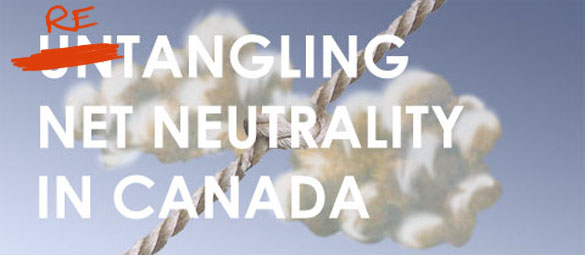What the CRTC taketh, the CRTC giveth (to Bell)
It was only two months ago that the CRTC made a surprisingly positive ruling in helping innovation in the Canadian internet marketplace, though I was somewhat skeptical. In August they announced that incumbent DSL and cable providers, aka the big guys (Bell, Rogers, Telus, Shaw, Videotron), had to provide 3rd party ISPs with access to their networks, at a price level of 10% above cost. Part of this reasoning was in the ruling itself…
Agreed that a duopoly of telephone and cable retail Internet access services is insufficient, and that wireless and satellite services are not yet attractive enough as large scale substitutes for wireline access in situations where wireline is available;
Found that smaller competitors bring price discipline, innovation and consumer choice to the retail Internet services markets;
Determined that these wholesale services will eventually be eliminated when
- Functionally equivalent, practical and feasible wholesale alternatives exist for the current wholesale access services; or
- When competition from all sources is sufficient to protect the interests of end-users, in retail Internet service markets, absent wholesale services;
[from the August ruling]
There’s no denying that even with a heaping dose of cynicism, when the CRTC made that ruling there was some hope that real competition could happen. Unfortunately, that hope lasted for a short two months, when they seemingly contradicted themselves with a ruling last week that Bell could start charging 3rd party on a Usage Based Billing model, including overage fees for bandwidth, which tentatively starts at the end of January 2011.
How it works now:
Company A pays Bell approximately $17-$20 a month per customer to Bell for the wholesale cost of the line running from their equipment to your home. Company A pays a backbone provider for the bandwidth they use to get out to the rest of the world, figures out a markup, and charges you the customer. This allows Company A to give customers a $35/m internet connection with hundreds of GB of data, or even unlimited data per month. Compare that to Bell, which charges $32/m with a 25GB maximum. If you use more data than your plan allows, they charge you extra.
How this ruling changes it:
Bell some time ago changed how it monitors data, allowing it to both track and shape Company A’s data outside of the central office (the junction point when service switches over). When this ruling goes into effect around the end of January (unless overturned), Bell can now charge Company A the same UBB overage fees (minus 25%) that Bell charges it’s own customers. When first sitting down to write this, the story Ray Liotta’s Henry Hill character relates to the Goodfellas audience about the restaurant owner who gets involved with ‘Paulie’ came to mind… (video below may not be safe for work)
While it’s true that there are other types of ISP services, Bell certainly has a monopoly on DSL in this part of the country. The point isn’t about competition between types of ISPs, but the fact that it was Canadian tax dollars that allowed Bell to build out the infrastructure, and now the CRTC is using our tax dollars to protect the company, as opposed to keeping the best interests of Canadians in mind.
One of the requirements for a 3rd party ISP is that they have enough equipment at the central office to support their customers and get them out to the internet at large. There’s no technical reason for Bell to be implementing UBB or throttling certain types of data on the networks run by the 3rd party companies. By allowing this the CRTC is stifling both innovation and pricing across the board. As we all well know, the big guys, whether in the ISP business or the mobile space, pretty much keep their pricing relatively similar.
If Bell didn’t get this ruling from the CRTC, it would force not only Bell, but the rest of the big guys, to look at their pricing models, and adjust accordingly, as companies like TekSavvy and Acanac have shown that they can survive even when paying the over-the-top line lease prices. For some reason, the CRTC has decided to basically cut Bell’s leash, even though they are mandated to do otherwise. It’s far from the first time that the CRTC has shown an inordinate level of favour with Bell. In the past the same 3rd party ISPs have tried to further distance themselves from any Bell requirements except for the raw copper that runs into each and every home, but every time they’ve tried to install their own infrastructure, Bell has complained about it.
The sad fact of the matter is that internet access in Canada is embarrassingly dated when compared to other parts of the world, precisely because of these types of rulings. Although the CRTC has made some positive rulings in the past, this one is particularly wrongheaded.





[…] This post was mentioned on Twitter by Doug Groves, rgbFilter. rgbFilter said: What the CRTC taketh, the CRTC giveth (to Bell): It was only two months ago that the CRTC made a surprisingly posi… http://bit.ly/cy5WC4 […]
[…] decision if the CRTC doesn’t do so itself. This time around, it’s the the contentious Usage Based Billing ruling that would have crippled 3rd party ISPs from differentiating themselves in the […]